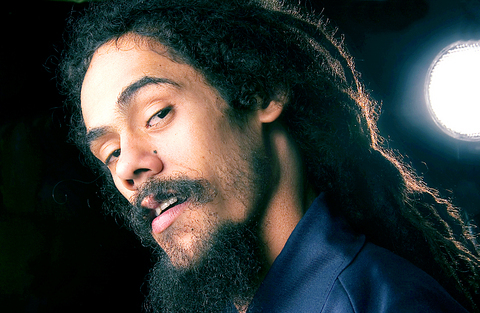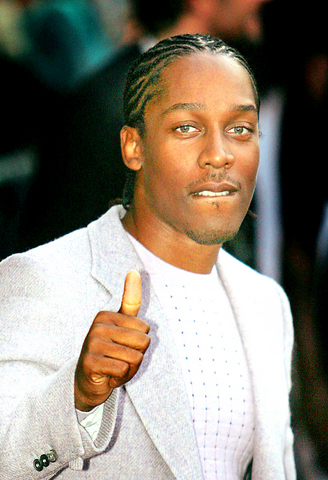China's godfather of electric rock Cui Jian assaulted Beijing late Saturday with his loud and angry wall of sound in his first officially sanctioned concert in the capital in 12 years. Some 10,000 fans gathered in the Capital Gymnasium to hear the 44 year-old perform the latest versions of his songs, many of which have been banned by a government wary of Cui's social and political criticisms.
"It was 12 years ago that I last performed here just after the release of the Balls Under the Red Flag album," the Beijing-born, classically trained musician told the crowd.
"If we have to keep on waiting then maybe they will let us come back and play here again in another 12 years."

PHOTO: AFP
Cui has enjoyed a rebirth this year with the release of his fifth studio album Show Your Colors, dedicated to the pitfalls of China's unprecedented urbani-zation, and a videotaped concert performance that was aired on state-controlled television in February.
The easing of restrictions against Cui's angry rap-inflected rock has come as the government shows an increased awareness of the commercial value of modern music.
British electronic music whizz Matthew Herbert is hoping to become the first musician ever to use the sound of cancer in a dance track.

PHOTO: AP
"I've found a guy, an American, that can record the sound of it," he said during an interview before a performance in Paris. The London-based musician is working on the follow-up album to Plat du Jour, released worldwide this year, which was made using sampled recordings of food to raise awareness about the industrialization of modern farming methods.
"My new record is going to be a disco record. So people might be out having a good time on a Saturday night but they might be dancing to a disco record and the beats are made from cancer," he smiles.
The know-how for this extraordinary feat would be provided by NASA via a scientist specialized in recording cellular activity. Herbert, 33, estimates he has sold 750,000 records worldwide. His unique blend of music is a collection of recorded sounds, mixed together into thought-provoking music with the help of computer technology.
The Plat du Jour album took him two years of research and six months of recording, included no traditional instruments, and used recordings of a free-range chicken being killed and the noise of more than 3,000 people biting into an apple. He also recorded an armored tank driving over a recreation of a meal cooked by British chef Nigella Lawson for UK Prime Minister Tony Blair and US President George W. Bush when the president came to London to thank Blair for his support in Iraq.
J.K. Rowling's latest book Harry Potter and the Half-Blood Prince sold more than twice as many copies in the US in its first two weeks as any other author's book in a whole year. The latest in Rowling's series about a boy wizard won the Best Seller Award for the top-selling book in America in the year to Aug. 1, even though it only went on sale on July 16.
US digital media company, Snocap, run by Napster founder Shawn Fanning, said it signed deals with various independent labels. Snocap said it reached agreements with V2 Music, Matador Records and the Beggars Group under which the labels will upload and register their music catalogs with SNOCAP's database services, enabling the digital distribution of their content through commercial peer-to-peer services.
Soul singer Lemar won UK act of the year and best album at Britain's annual tribute to music of black origin, the Mobo Awards, last week.
The former Fame Academy star beat Joss Stone and Estelle to snag Act of the Year and won best album for Time To Grow, during the 10th edition of the Mobos in London's Royal Albert Hall.
The awards cover R 'n' B, hip hop, reggae, jazz, gospel and world music. Lemar said he was "over the moon to win." Public Enemy was honored with an award for outstanding contribution to black music, while American singer-songwriter John Legend won best R 'n' B act, beating Lemar and Mariah Carey. The best Reggae act went to Damian Marley, who also accepted a posthumous achievement award for his father Bob Marley.

The entire saga involving the Taiwan People’s Party (TPP) and its Chairman Ko Wen-je (柯文哲) continues to produce plot twists at such a rapid pace that fiction publishers would throw it out for being ridiculously improbable. This past week was particularly bizarre, but surprisingly the press has almost entirely ignored a big story that could have serious national security implications and instead focused on a series of salacious bombshell allegations. Ko is currently being held incommunicado by prosecutors while several criminal investigations are ongoing on allegations of bribery and stealing campaign funds. This last week for reasons unknown Ko completely shaved

Gabriel Gatehouse only got back from Florida a few minutes ago. His wheeled suitcase is still in the hallway of his London home. He was out there covering the US election for Channel 4 News and has had very little sleep, he says, but you’d never guess it from his twinkle-eyed sprightliness. His original plan was to try to get into Donald Trump’s election party at Mar-a-Lago, he tells me as he makes us each an espresso, but his contact told him to forget it; it was full, “and you don’t blag your way in when the guy’s survived two

The self-destructive protest vote in January that put the pro-People’s Republic of China (PRC) side in control of the legislature continues to be a gift that just keeps on giving to the Chinese Nationalist Party (KMT). Last week legislation was introduced by KMT Legislator Weng Hsiao-lin (翁曉玲) that would amend Article 9-3 of the Act Governing Relations Between the People of the Taiwan Area and the Mainland Area (臺灣地區與大陸地區人民關係條例) to permit retired and serving (!) military personnel to participate in “united front” (統戰) activities. Since the purpose of those activities is to promote annexation of Taiwan to the PRC, legislators

Nov. 18 to Nov. 24 Led by a headman named Dika, 16 indigenous Siraya from Sinkan Village, in what is today’s Tainan, traveled to Japan and met with the shogun in the summer of 1627. They reportedly offered sovereignty to the emperor. This greatly alarmed the Dutch, who were allies of the village. They had set up headquarters on land purchased from the Sinkan two years earlier and protected the community from aggressive actions by their more powerful rivals from Mattau Village. The Dutch East India Company (VOC) had been embroiled in a bitter trade dispute with Japan, and they believed